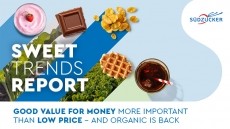Consumers are rejecting fat-free foods and beverages – what does this mean for manufacturers?

Once upon a time (the 1990s of course) the world of food and beverage was awash with reduced-fat and fat-free products, lauding their ability to help consumers lose weight and feel great.
It didn’t matter how much sugar or salt a product contained, if it was low in fat or, even better, fat free then it was a winner. How times have changed. The once celebrated low-fat and fat-free labels have all but disappeared from shelves, with consumers falling back in love with fat as understanding of its benefits grow, while other areas - we’re looking at you sugar and salt! – come under closer scrutiny.
So, what’s changed in the world of reduced-fat and fat-free products? And what does this shift mean for manufacturers?
Why was fat demonised in the 90s?
The answer to this question is fairly depressing for any person, or rather woman, who grew up during this time. Why? Because the world became obsessed with weight loss.
“The infamous 90s heroin chic look glamorised a gaunt and extremely thin appearance,” says fashion writer, Simra Ilyas. “Associated with high fashion, many fashion consumers engaged in the activities, which romanticised this appearance, such as heavy smoking and extremely restricted diets.”
And the food and beverage industry took notice, producing a whole range of reduced-fat and fat-free products to meet growing demand.
“Nineties snack logic dictated that anything fat free was healthy,” says writer and editor, Caitlin Petreycik. “Even if its first ingredient was sugar, as was the case with SnackWell's devil's food cookies, which sold out within months of their 1992 launch.”
And these types of foods and beverages weren’t just popular, they were everywhere.
"Many food products labelled as ‘fat-free’ or ‘low-fat’ were believed to be healthier options and encouraged for weight loss."
“Many food products labelled as ‘fat-free’ or ‘low-fat’ were believed to be healthier options and encouraged for weight loss,” says nutritionist, Susan Booth. “However, these products often compensated for the lack of fat by adding more sugar and unhealthy additives.”
And while it might have taken a while - read several decades – consumers are getting wise to the lies, realising that fat isn’t the villain they had been led to believe. And what’s more, many of these products actually lead to weight gain as #spoileralert sugar is the real villain of this story.
“Excessive unhealthy food and sugar-sweetened soft drink consumption has been linked to weight gain, as it provides a major and unnecessary source of calories with little or no nutritional value,” says a spokesperson for sugar-reduction campaign group, Action of Sugar.
All this is having a major impact on the food and beverage industry as consumers move away from reduced-fat and fat-free options.

Reduced-fat and fat-free sales are falling
Consumers are making their feelings on reduced-fat and fat-free products clear as sales have begun to decline.
“We’ve observed a significant decline in consumer demand for low-fat and 0%-fat yogurts,” Bethan James, brand manager for British dairy brand, Yeo Valley Organic, told FoodNavigator. “According to the latest IRI data for Total Yogurts & Yogurt Drinks, 0% fat yogurt sales have decreased by 9.9% in volume, compared to two years ago, while low-fat yogurt is down by 8.7%.”
Moreover, the Diet & Low Fat yogurt sector has seen a sharp decline, down 23.8% over the past two years.
And not only have consumers moved away from low- and no-fat products, they’ve actually moved towards full fat options.
“Full fat yogurt is seeing growth, with volume sales up by 6.3%, reflecting a broader consumer preference for more natural, less processed products,” says James.

Why are consumers rejecting reduced-fat and fat-free products?
There are a lot of reasons for this shift in consumer behaviour, but the overarching cause appears to be a greater understanding of what reduced-fat and fat-free really means.
“The decline in consumer interest in low-fat and fat-free products is likely due to a growing recognition that minimally processed, full-fat foods align more closely with human nutritional needs,” says Yeo Valley Organic’s James. “As consumers become more aware of the potential negative effects on long-term health, they are opting for wholesome, full-fat options without additives.”
The move towards full-fat products, at least in the dairy sector, is also being fuelled by one of the most powerful food and beverage trends in recent years – gut health.
“Research shows that full-fat yogurt cultures survive stomach digestion better, which supports gut health, further influencing consumer preference."
And, as with the rise in low- and no-fat products in the 90s, the industry is now responding to meet growing consumer demand for full-fat foods and beverages.
“There has been an industry shift reflecting this consumer trend,” says James. “Producers are increasingly responding to the demand for less-processed, nutrient-dense products by offering more full-fat options, while scaling back production and marketing efforts for low-fat and fat-free alternatives.”
And as for reductions in foods, the industry has now turned its attentions towards the growing consumer interest in low-salt and low-sugar products instead.





























